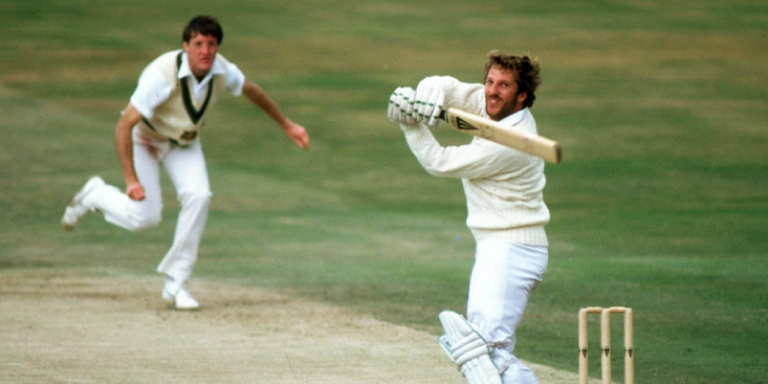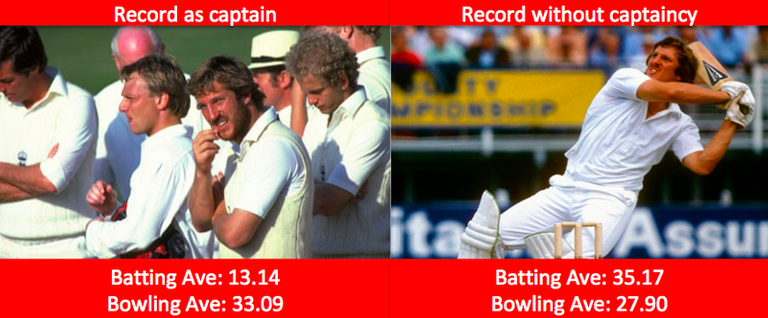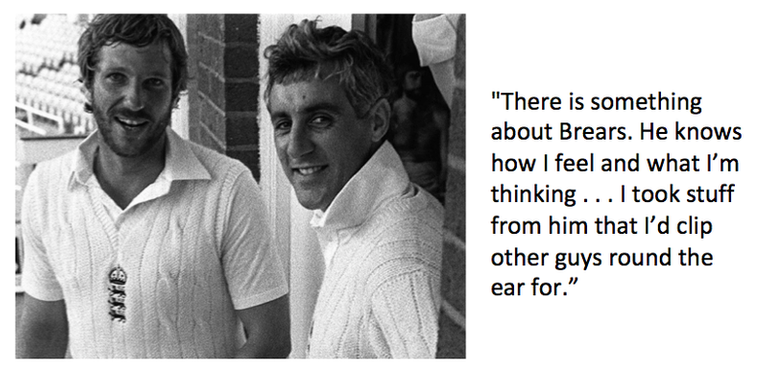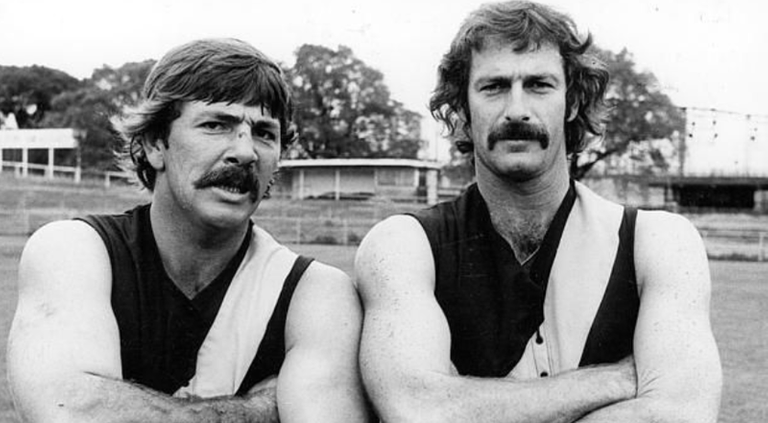Yesterday I wrote a piece suggesting that Ben Stokes' monumental efforts in securing victory for England in the 3rd Test evoked memories of a similar effort at Headingley nearly 40 -years ago by another English all-rounder with a penchant for pulling victory from the jaws of defeat, Ian Botham.
About a year ago I wrote a series of posts on Scorum alongside @cynisca and @haseez on some of the greatest sporting comebacks in history. My specialist subject was cricket and I recalled 9 moments in the sport when players and teams had returned from the brink of defeat to seal famous victories. Ben Stokes efforts yesterday set against the backdrop of his recent problems with the law would surely have made him a good candidate for 1 of the 3 blogs - The Greatest Player Comebacks in Test Match Cricket History.
What better time than now to begin to relive some of those great matches from Test cricket's past

Botham's Ashes
The 1981 Ashes series and in particular the 3rd match played at Headingley, will be talked about in cricketing folklore for generations to come as one of the greatest comebacks in the sport's history.
Ian Botham, England's legendary all-rounder and a proven match winner on many occasions, was the catalyst for this comeback. However, when considering the full extent of Botham's influence, it's worth rewinding to before that 3rd match to see a very subdued Botham as Captain of an England side that was misfiring in all departments.
Botham resigns as England captain
Captaining your national team in your chosen sport must be the greatest honour that any athlete can have. It therefore stands to reason that giving up that role or worse yet being asked to leave it must be one of the hardest things to overcome in a career.
Ian Botham took over the captaincy of England in 1980 at the age of just 25. In his first 10 matches in the job which preceded the 1981 Ashes series, he had failed to deliver a single win (7 draws and 3 defeats). Beyond just his team's inability to win was his complete lack of form while captaining his country which is shown in the comparison below.

Defeat in the first test of the series against the old enemy of Australia put Botham's position as England captain under immense pressure. He and his side would need a turn around in performance in the 2nd Test to get themselves back into the series and potentially salvage some of their careers. However, for Botham the match turned into a nightmare as he made a pair in front of the watching MCC members at Lords, the home of cricket. The silence that greeted him as he walked off the pitch for his second score of 0 in the game emphasized just how far Botham's stock had fallen over the last 18 months. His position as the captain had become untenable and he quickly resigned from the job before he was sacked.
To me, the initial appointment of Botham as captain signifies a problem not just in English cricket but in British sport in general in that we often pick the best player to captain the side as opposed to the best leader. Other recent cricketing examples would include appointing Andrew Flintoff and Kevin Pietersen to the position of England captain. These 2 along with Botham were what I would consider talisman of the team, match winners who could inspire others with their performances but who ultimately lacked the man management skills and tactical nous to become great leaders. These players were also free spirits who needed to be looked after and nurtured rather than burdened with the responsibility of captaincy. Removing the shackles of the top job from Botham was the start of his incredible rehabilitation in the summer of 1981.
Brearley's brilliance
If you were picking an England team based purely on their cricketing ability, then Mike Brearley would not have gotten anywhere near it. In 39 Test Matches, he never scored a century and finished his career with a paltry average of just 22. However, despite his lack of runs, Brearley is still regarded as one of England's greatest ever captains and sporting minds in general. His influence on the England team after he was reappointed as captain following Botham's resignation was immense. Botham himself states

One story that I have heard is that on the morning of the 3rd Test Match, Brearley actually walked up to Botham and told him that he would not be playing. Botham allegedly went berserk at this news, a state that Brearley left him in for a little while before asking him if he wanted to play. Botham stated in quite strong terms (I'll let you guess the language) that he was more than willing to play, at which point Brearley told him that if that was the case then he had better go and get ready.
Sometimes a captain needs to put an arm around the shoulder of his players and other times he needs to prod them into action. Botham was a man whose natural instinct was to be positive and always attack. Brearley had wound him up and let him go, what happened next is the stuff of legend ........
England 500-1 to win the game
Australia batted first in the 3rd game and put on a huge total of 401 on a pitch that was offering help to the bowlers. England in reply could only manage a meager 174 as Australia's pace bowlers easily cut through their batting line-up. With a lead of over 200, Australian captain Kim Hughes took the easy decision of asking England to follow-on and when they ended the 3rd day 6 for 1 still trailing by a massive 221 runs with just 9 wickets in hand it seemed likely that the match was all but over as a contest.
In fact, so sure were the England players that it was just a matter of time before they lost the game later that day that they had all checked out of their hotel rooms! By contrast, so confident were the Australians that they would win the match that they had already filled the changing room baths with ice and champagne by the time play started on Monday.

Rod Marsh (left) and Dennis Lillie (right) bet £15 on England to win at 500-1 odds. Despite collecting £7500 (the equivalent spending power of £27,300 in 2018) in winnings after the match the pair never faced any sanctions.
However, 2 Australian players in Dennis Lillie and Rod Marsh decided that the 500-1 odds on a home victory were just too good to turn down for a cricket match that was still only a little over the halfway point and so between them, they placed a £15 bet on England to win. When England slipped to 135-7, still needing 92 more runs to even make the Australians bat again, it seemed like that £15 bet was money down the drain. I wonder at that point what odds the same bookie would have offered them on an England win, 1000-1?
The joy of the game returns for Botham
They say a wounded tiger is a dangerous beast. The innings that Botham played was not only a spectacular return to form, but it was also a joyous celebration of sport by one of its greatest entertainers. Botham began this epic knock in front of a fairly small crowd as the public largely decided that they had better things to do on a Monday afternoon than watch England lose to Australia again. However, as his score built so did the belief both from Botham himself and the onlookers who slowly began to return to their seats. His attack on the Australian bowlers was brutal. Every shot was hit with power and purpose. For a man who had had his attacking instincts crushed under the weight of the captaincy, this innings must have felt like a massive outpouring of relief. No matter where the Australians bowled to him he went after them. This was a bowling attack that had been on top of England for 2 and a half games and who now found themselves helpless in the face of Botham's whirlwind attack.
"That's gone straight into the confectionery stall and out again" - The late, great, Richie Benaud commentates on Botham's 149*
Supported first by Graham Dilley and then Chris Old, Botham helped take England to 356 and a small lead of just 129 runs. While Australia were still firm favourites, England had given their fans something to shout about and had just the smallest chance of victory.
England become only the 2nd team in Test history to win after following on
This game took place before I was born but my dad had the VHS highlights of the series. In fact, I believe it was the first VHS that we as a family owned! Not only do I know every last bit of action that takes place in this incredible win but I can also recite almost every piece of commentary provided by the great Australian Richie Benaud and it still makes the hair on the back of my neck stand on end. Chasing their relatively small total, the Australians appeared to be cruising to victory at 56-1 until an inspired spell of bowling from Bob Willis ripped through the middle order to hand England a victory that 2 days earlier had seemed impossible!
This was a wonderful victory not only for England's cricket team but also for the public in general. The country was in the middle of the Thatcher years, not long after the winter of discontent and with many areas around the UK still struggling to come to terms with the reforms of the Conservative government, this win provided a welcome distraction.
As for Botham, his place in cricketing history was secured by him instigating arguably the greatest comeback the game has ever seen and his heroics would continue later in the series as England went on to win 3-1. When considering Botham's personal comeback, I think that Fred Truman sums it up best in his post-match presentation of the man of the match award by describing Botham's efforts as a "captain's performance that came one match too late".
Where does England and Ben Stokes heroics rank against 1981?
There is a fantastic analysis of the greatest comebacks in Test Match history on this blog here that ranks the 1981 victory as the 6th greatest comeback of all time. I'd imagine that with England's 1st innings score of 67, yesterday's win must surely feature on an updated version of the list.
I don't really know much about this sport but you a such a good writer.
Thanks :-)
One of my favourite matches to write about. It took a long time write but mainly because I kept watching the highlights again and again;-)
Great article. Sometimes the smallest totals are the most challenging. 130 doesn't seem like much but the pressure is on the fielding team to get things right as they don't have much to play with. There was another game in Australia against South Africa and Australia failed to make the 112 needed for victory.
The funny thing about yesterdays game was Michael Holding was the only one who said it is not over as it was literally a third day pitch and not a day 4 or day 5 pitch which was in England's favor. We forget about the time lost and lack of wear and tear on the pitch.
At least anecdotally speaking, it feels like Australia have historically struggled to score smaller 4th innings totals to win
Misbehave with new users